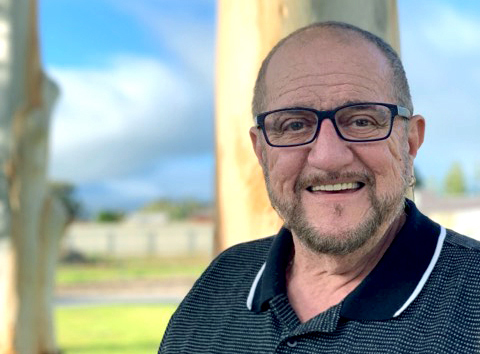
Kaurna and Peramangk Elder, David ‘Tarnda’ Copley has a distinguished career as a nurse, researcher and advocate for Aboriginal health reform, with a focus on mental health, substance misuse and cancer awareness.
With three degrees from Flinders University in nursing and mental health, David Copley (DipAppSc(DevDis) ’88, BNg(GradEntry) ’08, GradDip(MentHlthNg) ’09) is a pioneering graduate – in 1988 he became the first Aboriginal person to obtain a Diploma of Applied Science (Developmental Disabilities).
“My decision to go into Nursing and particularly Mental Health Nursing, was the lack of culturally appropriate health services available to Aboriginal and Torres Strait Islander people,” says David who is now a voice for Aboriginal and Torres Strait Islander people.
In 2007 and 2012 David was a finalist for Nurse of the Year in the HESTA Australian Nursing and Midwifery Awards. The awards recognised his achievements at Quitskills where he helped to double the number of Indigenous clients calling the smoking Quitline. David is a researcher at the Menzies School of Health Research at Charles Darwin University, where he chairs the Indigenous Reference Group. He has also served on the Advisory Board for the Menzies School’s Indigenous cancer research centre, DISCOVER-TT Centre of Research Excellence.
David, who survived stage three bowel cancer more than a decade ago, says he initially became involved in Aboriginal cancer research by chance, ‘however, the more I became involved, the more I saw the need for education and change.’ He has worked on the design and implementation of an Aboriginal and Torres Strait Islander culturally appropriate bowel screening kit and researching the impact that families and people in communities face when someone is diagnosed with cancer.
“Unfortunately, cancer survival in Aboriginal and Torres Strait Islander communities is still low and therefore not a topic for discussion, particularly with men as they see the diagnosis as a death sentence,” says David.
“I am an ambassador for The National Indigenous Cancer Network (NICaN) and together with other Aboriginal and Torres Strait Islander based research groups, we are starting to make a difference through education, research and training.”
David is in no doubt about the need for sustained systemic change to close the Aboriginal and Torres Strait Islander health gap. He says, “I would like to be able to say we are Closing the Gap on Aboriginal and Torres Strait Islander health, but the truth is we are not!
“In the Prime Minister’s 2020 Closing the Gap Report it showed that the Australian Government was actually failing in this area. I believe there are two main reasons for this failure: governments don’t consult with Aboriginal communities on their health needs; and we don’t have enough trained Aboriginal and Torres Strait Islander health professionals.”
David has spent the past 15 months tutoring at Flinders University’s College of Nursing and Health Sciences however, he will soon become the inaugural Indigenous Academic Coordinator at La Trobe University Rural Health School in Bendigo. He says this is not the end of his association with Flinders University, apart from cross university cooperation and possible future projects, he is hoping to commence his PhD with Flinders in the middle of the year.
David Copley was awarded a 2020 Distinguished Alumni Award for distinguished leadership in Aboriginal and Torres Strait Islander health, research and practice. With a focus on smoking cessation, mental health, and cancer prevention, treatment and survivorship.
Nominations are now open for the 2021 Alumni Awards to recognise Flinders University graduates who are making a difference in their field, to the community or to the University. Nominate now.

